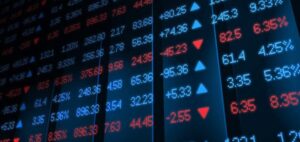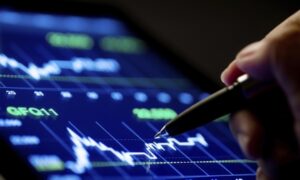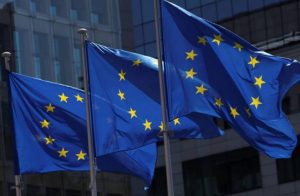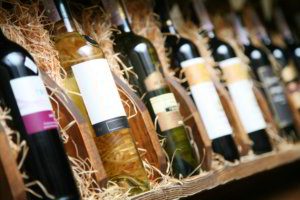
European stock indices generally show moderate growth during trading on Tuesday, with the exception of the region’s composite index and the French indicator.
The Stoxx Europe 600 composite index of the region’s largest companies was down 0.04% at 11:06 a.m. to 466.50 points.
The British FTSE 100 index rose by 0.15% during the session, while the German DAX rose by 0.1%. Italy’s FTSE MIB and Spain’s IBEX 35 added 0.3% and 0.2%, respectively. Meanwhile, the French CAC 40 fell by 0.06%.
Market participants are waiting for revised data on the eurozone’s GDP for the first quarter, which will be released later on Tuesday. The currency bloc’s economy grew by 0.1% in January-March compared to the previous three months and by 1.3% in annual terms, preliminary data showed. Analysts surveyed by Trading Economics expect the initial estimate to be confirmed.
In addition, on Tuesday it became known that unemployment in the UK in March rose to 3.9% from 3.8% a month earlier, while analysts generally did not expect a change in the figure.
The average weekly salary in the country, including bonuses, increased by 5.8% in January-March compared to the same period a year earlier, to 642 pounds. Excluding bonuses, the figure rose by 6.7% to 598 pounds.
Inflation in Italy, according to the final data, was 8.7% in April against 8.1% in March. Preliminary data indicated an increase in consumer prices by 8.8%, and analysts did not expect a revision.
Shares of Imperial Brands Plc fell by 0.7%, although the British concern, which includes the tobacco company Imperial Tobacco, increased pre-tax profit and revenue in the first half of fiscal year 2023, as well as raised dividends.
The price of Vodafone Group Plc shares is down 3.1%. The British mobile operator more than tripled its pre-tax profit in FY2023 due to the sale of Vantage Towers, but its EBITDA decreased by 1.3%.
Vodafone’s management also announced that it plans to cut 11,000 jobs as part of a three-year plan.
The capitalization of the British online retailer Boohoo Group PLC increased by 12%. The company reported a pre-tax loss for the last fiscal year and an 11% decline in revenue, but gave strong forecasts for the current fiscal year.
The market value of Bouygues SA is down 2.3%. The French conglomerate increased its quarterly revenue by one and a half times, to €12.01 billion, but slightly increased its net loss to €134 million.

Stock indices of Western European countries are steadily rising during trading on Friday, following Wall Street and Asian stock markets.
The composite index of the largest companies in the Stoxx Europe 600 region increased by 1.41% by 11:28 Moscow time and amounted to 419.92 points.
The German DAX rose 1.59%, the French CAC 40 rose 1.5%, and the British FTSE 100 rose 1.41%. The Italian FTSE MIB and the Spanish IBEX 35 gained 1.88% and 1.65% respectively.
Investors continue to evaluate the results of the meeting of the European Central Bank (ECB).
The ECB raised the base rate on loans to 1.25% per annum, the rate on deposits – up to 0.75%, the rate on margin loans – up to 1.5%. He also announced his intention to continue raising rates in the next few meetings.
ECB President Christine Lagarde said during a press conference following the meeting that further rate increases will be determined by incoming statistical data.
The ECB raised its forecast for consumer price growth this year to 8.1%, next year to 5.5%, and in 2024 to 2.3%. In June, the bank’s analysts estimated these figures at 6.8%, 3.5% and 2.1%, respectively.
According to the new forecast, the GDP of the Eurozone in 2022 will increase by 3.1% against the previously estimated 2.8%. However, expectations for the coming year are worsened to 0.9% from 2.1%, for 2024 – to 1.9% from 2.3%.
Meanwhile, the energy crisis remains a reason for investors’ fears. Market participants are worried about the consequences of the crisis on the eurozone economy, writes Trading Economics.
Statistics released on Friday showed that industrial production in France fell in July for the first time since April, indicating that companies are cutting production amid slowing demand and high price pressures.
The indicator decreased by 1.6% in monthly terms after rising by 1.2% in June. Economists polled by The Wall Street Journal had expected a 0.5% decline in industrial production.
Among the growth leaders among the components of the Stoxx Europe 600 indicator are shares of the German energy company Uniper SE, which are rising in price by 10.5%.
Shares of London Security PLC are down 4.8%. The British fire protection company cut its pre-tax profit in the first half of the year amid rising costs due to inflationary pressures.
ASOS PLC added 1.6%. The British retailer is forecasting FY22 revenue and earnings in line with analysts’ expectations, but said August sales were weaker than expected.

The European Union does not recognize the decree of Russian President Vladimir Putin, which prohibits foreigners from owning land in Crimea, and considers its entry into force as yet another attempt to forcibly integrate the illegally-annexed peninsula into Russia, EU Spokesperson for Foreign Affairs and Security Policy Nabila Massrali has said.
“The European Union does not recognise the illegal annexation of the Crimean peninsula by Russia, which is a clear violation of international law. Therefore, the European Union does not recognise this decree and considers its entry into force as yet another attempt to forcibly integrate the illegally-annexed peninsula into Russia. Crimea is part of Ukraine,” the spokesperson said in a statement released by the European External Action Service on Tuesday.
According to her, this decree is also a violation of international humanitarian law, as it is another step towards the imposition of Russian citizenship on the peninsula, which leads to the arbitrary deprivation of property.
“The European Union calls on Russia to stop all violations of international law on the Crimean peninsula. The European Union is unwavering in its support for Ukraine’s independence, sovereignty and territorial integrity within its internationally recognized borders, and welcomes Ukraine’s diplomatic efforts to this end,” Massrali said in the statement.
The spokesperson also said the European Union will continue to enforce its non-recognition policy of the illegal annexation of the Crimean peninsula, including through restrictive measures.
The Russian presidential decree states that most of Crimea and the city of Sevastopol were added to the list of border territories of Russia, where foreign citizens are prohibited from owning land, entered into force on March 20, 2021, a year after its adoption.

More than 20 Ukrainian companies have entered the European Clean Hydrogen Alliance, Deputy Energy Minister for European Integration Yaroslav Demchenkov said.
“More than 20 Ukrainian companies have already joined the European Clean Hydrogen Alliance and, accordingly, the Green Hydrogen Initiative for the European Green Deal 2×40 GW of new hydrogen production capacities,” he said during the First German-Ukrainian Energy Day on Tuesday.
“Considering that the creation of 10 GW of new capacities for the production of ‘green’ hydrogen has been allocated to Ukraine, this imposes certain obligations on us,” Demchenkov noted.
According to him, already in January Ukraine will be ready to present an assessment of the potential for the development of the domestic hydrogen market, including its use in transport, as well as an assessment of the impact of this direction on the environment.
At the same time, the Deputy Minister pointed out that already now there is a portfolio of ten real projects for the development of “green” hydrogen, which can be implemented, including with German partners with the support of European financial institutions.
“We are interested in joint projects with German business,” Demchenkov stressed.
In turn, Pavlo Stanchak, Deputy Director General for Development and Transformation of Gas Transmission System Operator of Ukraine LLC (GTSOU) said that, having created a decarbonization group, GTSOU is actively exploring the possibilities of the gas transmission system for the transfer of hydrogen and mixtures with it, and is also preparing for a pilot project that will show these possibilities.
According to him, GTSOU has a significant stock of maneuverable capacities for pumping gas, which is several times higher than the needs, and they could be used to transport “green” hydrogen and mixtures.
EUROPEAN, EUROPEAN CLEAN HYDROGEN ALLIANCE, HYDROGEN, UKRAINIAN COMPANIES

The European Commission jointly with European alcohol producers intend to publish the Counterfeit and Piracy watch-list for Ukraine with the purpose of comabting counterfeit alcohol sale in the EU partner countries. The Ukrvodka association said in a press release that the European initiative is aimed at revealing online and private marketplaces that allow producing and selling counterfeit and smuggled goods in the countries, which are not members of the European Union.
“The Ukrainian illegal alcohol market reaches 60% and withdraws about EUR 360 million from the budget. The European Commission plans to officially publish the Counterfeit and Piracy watch-list this year and update it regularly,” the association said.
According to the European Commission, the illegal market is a “concrete scourge for the economy,” it hinders investment and employment in the sectors related to the production of alcohol.
According to the European Union Intellectual Property Office (EUIPO) and the Organization for Economic Cooperation and Development (OECD), about 5% of EU imports worth EUR 85 billion annually are unsafe counterfeit goods, mainly from neighboring countries.
According to the report, the attention of Europeans was attracted by the investigation of the Ukrainian anti-corruption human rights organization. According to their data, half of the state-owned distilleries produce illegal alcohol, and illegal vodka is also produced at distilleries: 10 out of 30 distilleries produce counterfeit goods.